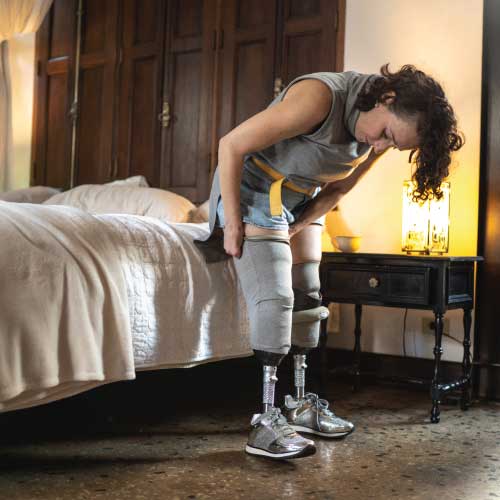The Mobile Prosthetic and Orthotic Care: Shaping the Future of Limb Loss Support for Veterans
Reading Time: 3 minutes
Getting quality orthotic and prosthetic care can be difficult for veterans living in rural areas. The time spent traveling and the need to consult multiple specialists can result in lengthy delays. The good news is that the Veterans Affairs (VA) Mobile and Prosthetic and Orthotic Care (MoPOC) program is changing care delivery for veterans with limb loss and mobility issues in these areas.

Since receiving funding for expansion in 2021, MoPOC has significantly improved the accessibility of prosthetic and orthotic specialty services for veterans who face difficulties reaching VA facilities. This program brings essential healthcare directly to VA Community Based Outpatient Clinics and even to veterans’ homes.
The mobile units are manned by VA-certified prosthetists and orthotists and equipped with state-of-the-art tools and technology to deliver comprehensive care on-site. Their services encompass the creation, adjustment, and fitting of personalized orthotic and prosthetic devices.
About 54% of enrolled rural veterans are 65 or older, emphasizing the critical role of MoPOC’s services. By bringing healthcare directly to veterans, MoPOC alleviates the challenges of travel, saving them valuable time and effort.
MoPOC decreases the need for veterans to visit multiple providers for various services. This streamlined process accelerates care and enhances health outcomes for veterans.
In Tennessee, the program has had a profound effect. Alexandra Rodriguez, MoPOC Program Support Assistant for the Tennessee Valley VA, said in an interview with Newsbreak that their mission focuses on enhancing outreach, rebuilding trust, and ensuring veterans feel supported and cared for. Rodriguez’s proactive approach, which includes offering after-hours assistance, has greatly increased trust and improved veteran participation before, during, and after receiving care.
The program also reduces the need for veterans to seek care from multiple providers by easing direct communication between MoPOC staff and VA personnel. This efficient approach not only speeds up the delivery of care but also improves health outcomes for veterans. It enables Care Partner Organizations (CPOs) to connect with rural patients, offering a range of services all in one visit.
Additionally, the program decreases the need for veterans to visit multiple providers for various services by enabling direct communication among MoPOC personnel and VA staff. This streamlined process accelerates care and enhances health outcomes for veterans, allowing Care Partner Organizations (CPOs) to reach rural patients and provide them with various services in a single visit.
In an interview with Newsbreak, Eric Harmon, a prosthetics supervisor who manages logistics and oversees the MoPOC staff, said that the program gives clinicians greater flexibility and speeds up procedures. It enables them to leverage relationships within the VA to improve care for veterans.
MoPOC is currently operational at the following Veterans Affairs Medical Centers (VAMCs) or MoPOC locations across the country, including sites in Grand Junction, Colorado; Guam; Iowa City, Iowa; Lexington, Kentucky; Fargo, North Dakota; Grand Island, Nebraska; Albany, New York; Syracuse, New York; White City, Oregon; Columbia, South Carolina; Sioux Falls, South Dakota; Memphis, Tennessee; Nashville, Tennessee; American Lake, Washington; and Seattle, Washington.
As MoPOC continues to grow and enhance accessibility for veterans, it stands out as a model for rural healthcare delivery. The commitment of its team guarantees that veterans in rural areas receive the compassionate and comprehensive care they need, promoting independence, mobility, and trust.











































































